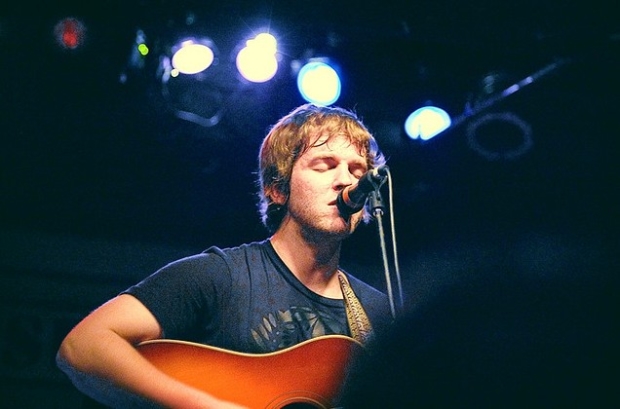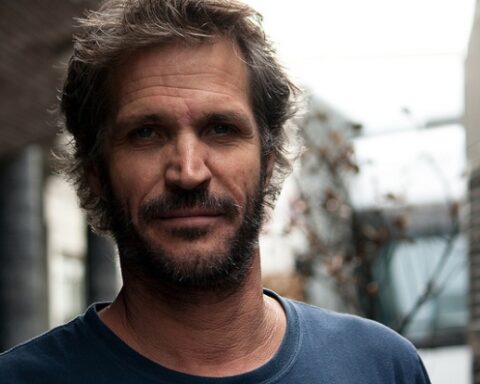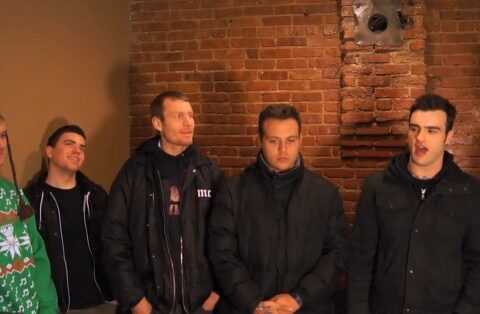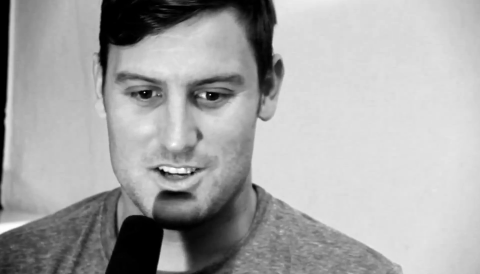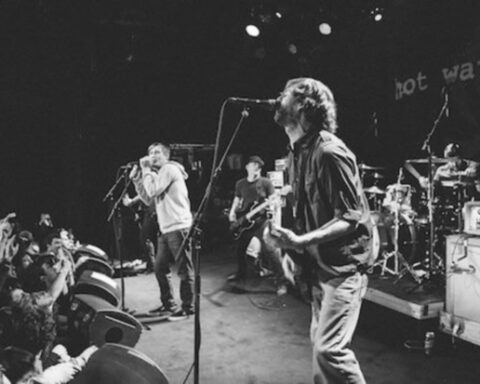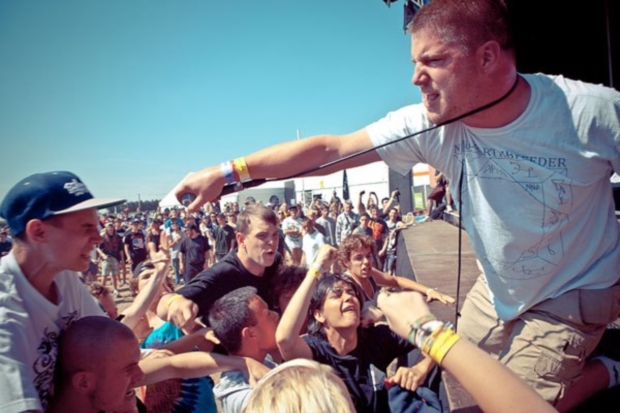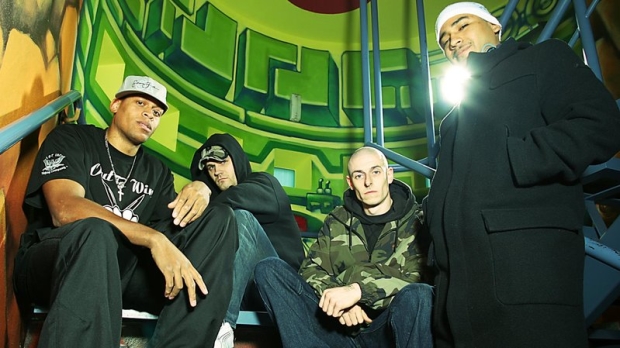SAVES THE DAY vocalist Chris Conely and guitarist Arun Bali were recently interviewed by Alter the Press!.
Last year you finished “Daybreak”, completing the trilogy that you were working on. What was 2011 like for you as a whole and how do you feel having come to the end of such a cathartic project?
Chris: When we were finally finished with the album it definitely felt as though we had completed something really big. It was such an enormous project to undertake and it took many, many years to complete, so it was definitely a triumph. I feel like just making the album was a success for us, and finishing the trilogy is something I’m very proud of. So 2011 was a year for re-imagining where we could take the band. It was like a new beginning almost, because we’d finished this project, we were ready to release it and then go on a world tour to promote it. We had such a great bunch of guys together and we felt like we could really take the band wherever we wanted. I think 2011 was one of the best years, for me, anyway, in my whole time doing Saves the Day, and then moving into this year it’s felt like our mission is going well. We set out to make an album that was cathartic, as you say, and then getting to play the songs on stage feels really good. It’s such a release and our fans seem genuinely excited about the new music.
Arun: That feeling really carries on into this year too. The wait between “Under The Floorboards” and “Daybreak” was a lot longer than we would have liked to have taken, so when we were done there was a huge weight off our shoulders. Sonically I think we swung for the fences. We wanted it to sound how we wanted it to sound and that’s not always attainable. I feel like we got it to a stage where we were really happy with it, and it just gets us excited to do another one and not have that long wait in-between records. The band is firing on all cylinders right now, so it’s nice. It’s a good place to be.
“Stay What You Are” has been out for twelve years now. I feel like it’s a personal milestone record for a lot of people, do you feel that way as a band?
Chris: Yeah, it seems like that record really connected with a lot of people. We get a lot of bands coming up to us saying they never would have started playing music if it weren’t for that record, and that is surreal…in the best way. Sometimes you watch a band playing to 10,000 people at a festival – which is something Saves the Day will probably never be able to do, we operate under the radar – and then the band will come off the stage after they havedestroyed this massive audience and they’ll act, like, embarrassed or nervous around us, and then they say that we’re their heroes… It’s just a very strange and cool feeling. So I’m honored that that record still is important for people.
How do you feel like you’ve developed as a band or for you, Chris, as an individual since you first started playing? And how does it feel playing the older material now?
Chris: It feels so good to play the music. Every song was written from such an honest place so it just doesn’t feel empty, you know? I still feel the truth in the words and I’m still excited about the songs, so for me it’s a blast to play them still. I think the band has continued to evolve even from before “Stay What You Are”. I mean, the first album is very different from the second, and then the second is different from “Stay What You Are” and it just kept growing from record to record. I’m proud of the growth and I’ve definitely learned a lot as a person. I know that little things that are sort of seen as roadblocks at the time can sometimes actually be opportunities when you look back in hind sight. So even at times where things didn’t seem like they were going our way, there were a lot of lessons that needed to be learned, so it was all an important journey. I think as an individual I’m just much more content just being who I am, and I feel so thankful for my longevity in the world of music. I think now the four of us together are really good as a group. We all appreciate each other, we respect one another, and we like the music that we all make together. I would say I’m a fan of each of the guys in the band and that’s really cool. That’s something different from the past. It’s always been sort of a creative struggle in the band; to have a clear vision of what I’m imagining the songs to be, and then sometimes it can be hard to communicate that to other people if they’re not sharing that vision. Now we all are on the same wavelength so it’s much more exciting for me as a songwriter.
ATP: Saves the Day has gone through a huge amount of line-up changes. Was it ever difficult trying to get new members to settle in?
Chris: I think the hardest change was when our original drummer Brian Newman left in 2001. He’s the guy I started the band with, so when he left I just didn’t want him to go, and he was really the first person that was hard to let go of. I think everybody else that’s come and gone has been very natural, like, they came into the band and they spent their time and then it didn’t work out personally or musically and we just parted ways. It wasn’t always amicable, but it was always necessary. It’s hard when there’s conflict, but overall it’s been smooth for me, and the way I see it is that I feel very lucky to have been able to play with such incredible musicians for so long. They get better and better, and now I have this band of guys that I really look up to and admire as musicians, so I feel like I finally have the band that I always wanted.
Arun: Speaking of the evolution of the band – that to me is more exciting, to be in a band that evolves. There’s bands that get huge or there’s just the one thing that they do, and that’s great, but for me growing up as a musician I like evolving and trying new things and finding things to do next that will challenge ourselves as artists. I’ve been in the band for a while now, but I remember joining and learning this catalog of songs and seeing that progression and hearing it getting better and better. So that was exciting to me, and then being a part of “Daybreak” and moving on to what we’re going to do next. I wouldn’t want to sound the same on everything and it’s nice to see what’s going to happen next without really knowing. It’s never really a calculated thing, it just happens. Everyone gets older, we grow up and influences change, but that’s great.
ATP: Do you think that’s one of the main factors to maintaining strength and longevity within the music industry?
Chris: It’s funny, you know, you do see bands that have a big successful album and then they try to recreate it. Sometimes it really works well for like a couple of records, but people get tired of it. I think that it might be a little harder to predict the success of your career if you’re just writing music from your heart and you’re not trying to find that successful formula, so your music constantly grows. Honestly, I feel that people connect with the sincerity more than when it’s calculated, and I do think that’s the reason Saves the Day gets to stick around.
Arun: Bands evolve differently. I think that’s important to a lot of people now that the industry has changed. It’s not what it used to be, and I think a lot of bands typically have like a three album lifespan and that’s it, they just run out of ideas, but I think the honesty of Saves the Day is what keeps it going. It means a lot to a lot of people.
ATP: Well, fifteen plus years is a pretty big accomplishment, especially now when, like you said, a lot of bands put out a couple of records and then drop off the radar.
Chris: Yeah totally. Even if they’re the biggest band in the world, you know? I mean Fall Out Boy came and went and they were the biggest band around for a while, but they just couldn’t really sustain it.
ATP: Chris, do you think that working with so many different musicians and being involved with side projects helps you keep a fresh sense of creative perspective?
Chris: I definitely like to be surprised by what other musicians do. I wouldn’t say that I was looking for that when I got into music, but I do feel lucky that I’ve been able to play with such a wide variety of musicians. I think the number one thing it’s done for me is help me to appreciate my situation now, because I recognize how incredible these guys are on their instruments, having played with…everyone there is to play with! I know how good these guys are, and I know how I want the band to be. So there’s not a single bone in my body that craves change. I’m totally happy with how it is.
ATP: What’s it like working with Coby, Max and David with Two Tongues?
Chris: It’s so much fun! Two Tongues was the first time I really seriously tried to collaborate with somebody, and it was so easy with Max. Now I’ve actually tried that a number of times with people and it doesn’t always work out, so there’s something really special that happened when we wrote together. We’re going to do another album at some point soon. It’ll always just be like half Saves the Day and half Say Anything, so Arun will be a part of the next Two Tongues record and I think all of us will work really well together. It helps when you have mutual admiration and respect, and I’m a fan of Max, you know? So when he’d show me an idea I’d be pretty excited and then I’d be excited to add something to it, so that was a blast.
ATP: As musicians you all seem to pull a lot of different influences from a lot of different places. For example there’s a Ween cover on the first Two Tongues record. What would you say your biggest influences are at the moment?
Chris: This is funny because I feel like I’m so late to the party on this one, but I’ve been flipping out on Radiohead…
Arun: That’s a party that’s still going on!
Chris: See, everybody else knows about that and how good they are…
Arun: That party is no where near ending.
Chris: Yeah! Their records are, right now, a huge source of inspiration for me. They’re so deep and there’s so much going on in each record. I mean, in general, The Beatles are my favourite band of all time…by far. There’s nobody that really comes close to them for me. I really like Nirvana though, too. They just have only those few records so there’s not as much to dive into.
Arun: Zeppelin rules, man!
Chris: Zeppelin! They’re the reason I wanted to make my own music. I probably would never have been a musician if it weren’t for Led Zeppelin. I liked music a lot before then, I just never thought to make my own.
Arun: Pink Floyd was a big one for me. I grew up on a lot of classic rock. Also singer-songwriter stuff like Elliott Smith. He completely changed my life and the way I viewed song arrangements – just getting away with doing cool shit in really simple songs. He just did it so effortlessly. He’s a great, great songwriter.
ATP: You’ve said that now that “Daybreak” is done you’ve opened a new chapter, in a way. Do you have an idea of the direction you’d like to go in with the new album?
Chris: The skeletons of the songs are already there. We’ve got ten songs, I think, for the next record already – without lyrics, but the melodies and chords and everything. It feels quite different. Each record is always a departure from the last. As Arun said, unintentionally it just sort of happens and you sit back going “wow, that’s different”. It’s upbeat, and it feels way happier than anything the band has done, even before “Stay What You Are”. That record was feels kind of of dark to me, but it’s really poppy. “Through Being Cool” is the only really happy feeling album, and even the lyrics on that are all about longing. So this will probably be the most uplifting, positive Saves the Day album yet.
Arun: There are a lot of classic Saves the Day melodies.
Chris: Definitely! It definitely sounds like Saves the Day, but it feels like the future. It’s sort of…I wouldn’t even know how to describe it. When I was trying to tell these guys about it I was like…it’s kind of upbeat like”Through Being Cool” and “Stay What You Are”, it’s interesting musically like “In Reverie” but it’s also something the band has never done. It feels like it’s forward reaching.
ATP: Do you normally write the music first and go on to do the lyrics afterwards?
Chris: Yeah, lyrics are always at the end for me. I’m a total melody guy. I rely on melody to write the song. It’s like, the part that you would hum in the shower is what the song is to me. Once I have a melody I hear it drifting around in my head, I’ll notice what it is, then I’ll go find the chords that compliment that. Then once I have all that I’ll play it for a while, then another part will come out and then another and then you start playing around with how they’re going to be structured. So I always start like that, and the lyrics will happen way later… like, months and months later. It’s rare that I’ll start with a lyric, but I also have notes in my phone or in my journal and I’m constantly writing down ideas. Everyday there’ll be something that pops into my head, or I’ll be driving by and noticing people on the sidewalk or overhearing somebodies conversation, so I’m constantly working on the lyrical ideas but very rarely will I stop to put them to music until the song is mostly done.
The rest of the interview can be read here.
Photo by Nirazilla.



